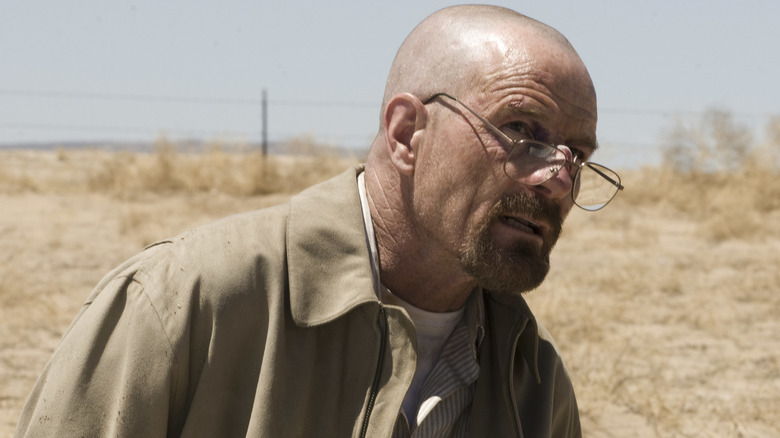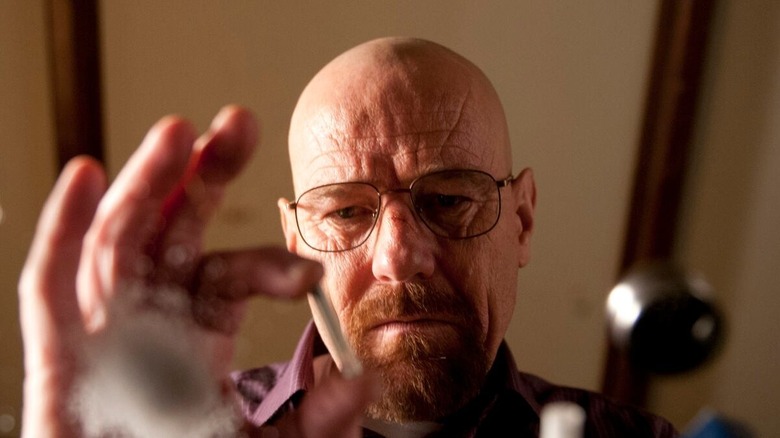Breaking Bad's Writing Room Had One Simple Rule That Guided The Show
Back when "Game of Thrones" concluded its run with one of the most controversial finales in modern TV history, a hot topic of debate amongst fans was whether the fact that showrunners David Benioff and D.B. Weiss knew how the show's source material ended affected the trajectory of the series and effectively ruined the adaptation. The argument was that "Game of Throne" had already made lots of changes to the story from George R. R. Martin's original books (mostly due to them having to cover stuff that Martin hadn't written yet), so much so that suddenly going back to Martin's initial plan for the final episodes felt abrupt and nonsensical. Would it have been better if Benioff and Weis had come up with a new ending designed specifically for their version of the narrative? We may never know.
Almost a decade earlier, another incredibly popular and game-changing TV drama had an equally hotly-debated ending: "Lost." The ABC drama changed TV forever with its pilot episode, and by the time the finale arrived, it instantly sparked a whole lot of discussion. In the eyes of many of its critics, the "Lost" finale failed to answer a lot of the questions that the show had previously raised (questions the audience felt were promised to them). However, in the eyes of most of the finale's defenders, the series has answered the questions it needed to. Most importantly, the episode was focused on the show's characters and their journeys, which had notoriously changed dramatically from what the "Lost" creatives initially had in mind.
There is no simple answer to this, of course, and no approach works 100% of the time. Sometimes, great TV shows have ended exactly the way their creators originally planned, while other well-regarded series moved ahead without a clear endgame in mind. That includes "Breaking Bad," widely considered one of the best shows of the 21st century.
In a 2013 article he wrote for Time Magazine, "Breaking Bad" scribe Thomas Schnauz explained why the show was ending. According to him, it was because the series' staff writers had a hard rule to "never force the characters in any direction but to let them take us there — and Walt was taking us to the end of the road."
Breaking Bad and the beauty of unplanned storytelling
Indeed, "Breaking Bad" is famous for not really having a plan for its ending. For many, this also makes Vince Gilligan's series about a school teacher who becomes a feared drug lord the perfect antithesis of "Game of Thrones" (i.e. it's a show that did not follow a clear road map yet had a widely acclaimed and beloved finale).
Like many series, "Breaking Bad" changed from what its creators originally had in mind thanks to both its casting and the fan response to its actors. Indeed, Jesse Pinkman was famously supposed to die at the end of season 1, but when it became clear Aaron Paul and Bryan Cranston had incredible chemistry (no pun intended) as the former and Walter White, Jesse became the heart and soul of "Breaking Bad" instead. But it went further than that. The show's writers often included ideas that they merely thought were cool, plain and simple. There were even times when the series' other creatives found themselves questioning Gilligan's sanity, like when he decided to incorporate a scene at the beginning of the final season where Walt buys an M60 machine gun and places it in his car's trunk. Indeed, it seems nobody had the slightest notion where this would lead in advance.
The solution? Have Walt use the gun to kill some Nazis and rescue Jesse from Todd (Jesse Plemons) and his uncle Jack's (Michael Bowen) criminal gang in the show's finale. "Who doesn't love seeing a bunch of Nazis getting mowed down with a machine gun?" Gilligan noted. So, what started as a basic plot hook led to a satisfying conclusion for both Walt and Jesse — one that came late in the writing process and without any planning whatsoever, beyond letting the show's characters take the writers to where they needed to be.
That is the big criticism that's been raised against the final episode (and final season) of "Game of Thrones:" It was too focused on ending the same way that Martin plans to conclude his books, as opposed to Benioff and Weiss allowing the series' characters to dictate where its story ought to go. "Breaking Bad" knew better, and that's why, over a decade after it ended, it's still considered one of the best TV shows of all time.

